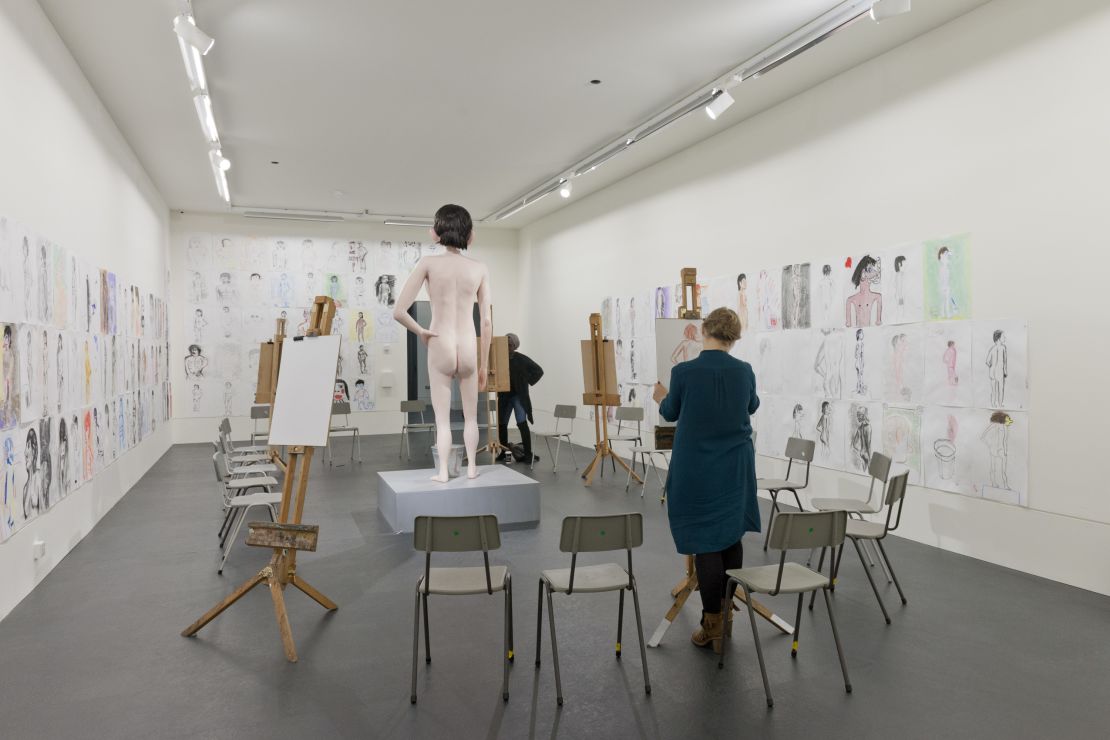Editor’s Note: This video is a segment from the CNN Style show.
Story highlights
British artist David Shrigley recently unveiled his fourth plinth commission in London's Trafalgar Square
Titled "Really Good", the giant thumbs-up sculpture coincides with political upheaval in Britain
But the artist says the nation he loves has made a huge mistake in voting to leave the EU
For David Shrigley, there’s no place like home.
The British artist loves the way his nation holds self-deprecation, irony and comedy close to its heart – and close to its art.
Nowhere else compares for the Turner Prize nominee.
“Americans are less fond of using irony than the British are,” he says. “The British use irony in almost every sentence, whereas Americans use it for special occasions…There’s a certain dark humor that runs through the British sensibility, I think.”
What of our Francophone cousins?
“The French art world likes theory, that’s true,” he muses. “Sometimes one feels that one is illustrating the curator’s catalog essay when one is selling to French institutions.”
But don’t mistake Shrigley’s pride in Britain’s art community for pride of nation. To his mind the nation has just made a large mistake.
A vocal opponent of Brexit, he describes the EU as “an aspiration for cooperation between nations and for a commonality.” Leaving, he says, “was a rejection of those aspirations.”
David Shrigley: Selected works
Thumbs-up?
Unveiled into this climate was Shrigley’s Fourth Plinth in Trafalgar Square.
Titled “Really Good”, the eleventh incarnation of Britain’s biggest public art commission features a giant hand cast in black bronze with a large, elongated thumb. It’s a playful work, but one that’s hard to describe as beautiful.
It’s also a sculpture that has been read in many ways: among them a large, sarcastic thumbs-up placed at the heart of Brexit Britain.
Is Shrigley’s work always this political?
“I think all art is political, to a greater or lesser degree,” he argues. “All public art is political because the context becomes half the work, sometimes more than half the work.”
But, he says, “if you want to make a political statement you’re probably better off being a journalist or a polemicist. I think as an artist you say things – or I say things – where the meaning is yet to be determined or is negotiable.”
While remaining coy, the only reading Shrigley will rule out is the possibility that “Really Good” is “an endorsement of right wing political ideas.”
“Too shy to be a real rebel”
Shrigley emerged in the slipstream of the Young British Artists (YBA), a clique who took the 1990s by storm.
The YBA’s world of unmade beds and bisected sharks normalized a certain tongue-in-cheek narcissism in art, and injected an irreverence which remains pumping through the veins of Britain’s contemporary art scene today.
Shrigley has been more than happy to pick up the mantle – just don’t ask him to take any credit for contemporary art’s current popularity.
“Contemporary art is more popular now than it ever was,” he says, “and I think more people have a knowledge of contemporary art. [But] I suspect that’s more to do with artists like Banksy and street art and things like that than it is to do with the likes of Tracey Emin and myself.”
An artist who describes himself as “too shy to be a real rebel,” Shrigley nevertheless revels in the anarchic comedy in his work. But that’s not to say he doesn’t think it can be constructive.
“Ironically, as an artist you have to believe that your work makes the world a better place,” he argues, “because there has to be some kind of positive intervention in the world.”

“I’ve realized [‘Really Good’] is an artwork that’s I guess both ironic and sincere at the same time.”
So, if we’re being sincere, what’s the enduring appeal of the motherland?
“When you’re an artist, you can kind of live anywhere if you want, because you don’t have a proper job and the artwork that you make usually isn’t dependent on a certain space,” he explains. “I chose to live here because I like it. I like the music and the football and the irony.”
And the pub?
“And the pub. There’s good pubs.”
You’d be hard-pressed to find a Brit who wouldn’t give two thumbs up to that.
Watch the video above to find out more about Shrigley’s take on the world of contemporary art.



























































